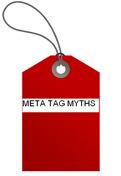Meta tags come with many myths attached. What works, what does not work and more importantly how to go about writing the Meta tags. With the search engines not indexing description tags for ranking, the approach to meta tags has been altered. Where are you going wrong, as far as meta tags are concerned, is what you will get to know from this write up.
Where You Stand:
 The abuse of description meta tags by stuffing them with irrelevant keywords, to get higher rankings led to search engines not indexing them for ranking anymore. However, you must know that they may still work, in a different way though. Here is a quick info on the types of meta tags:
The abuse of description meta tags by stuffing them with irrelevant keywords, to get higher rankings led to search engines not indexing them for ranking anymore. However, you must know that they may still work, in a different way though. Here is a quick info on the types of meta tags:
- Meta keywords- These tags tell search engines the keywords/ phrases the page should rank for. These selected keywords contain a list of, 25 words (advisable number) selected from the text.
- Meta descriptions- These tags summarize the content of the page. Visitors can then get to know what they will find once they go to the site. Google does not take the description tag for ranking, however, it is useful to the people. Description tags contain a sentence of up to 150 characters that describes the page content.
- Meta robots- These tags interact with search engine spiders to tell them what to (and not to) read.
- Author, copyright, rating and distribution tags can be very handy in providing further information about the page in question.
Where Are You Going Wrong- The Myths
Whatever you hear about meta tags, may or may not be true. Here are some of the more common meta tag myths around today that you must be aware of-
Myth #1 – Provide As Much Information As You Can In The Meta Tag-
If you think that stuffing the meta tag with as much information as possible will do good for you, well you are wrong. In some cases, site owners also include the copyright, author, region tags along with the regular ones. You have to keep it crisp and relevant and simple.
Myth #2 – Stuff Them With Keywords-
Thinking that keyword meta tags must be full of keywords- that are not at all relevant to your site, is totally wrong. You are way off-course here. Google stopped using meta keywords tags, just because of this irrelevant keyword stuffing. Other search engines too place very little weight on it. It is relatively useless now, and redundant. So, the right thing to do here is to use keywords, that are relevant to your page and target audience.
Also, there is no keyword listing formula. Whether you use commas or spaces between them, really doesn’t matter.
Myth #3 – The Title Tag Is Not That Effective-
Title tag is the most important tag on your page. It helps both the audience and the engines understand your content. You must strike a balance between writing for search engines as well as visitors (the title tag motivates a click through). When creating title tags, keep in mind your branding purposes. You can limit these tags to a maximum of 90 characters with spaces.
Myth #4 – Following The Competitor’s Tags Works-
OK. We all know that knowing what the competitor is doing helps, but not in this case. The way a tag may work for your competitor depends on their site structure, page content, keywords, alt tags, the URL, link popularity and other factors. So it is quite possible that search engines will see your sites differently based on the above mentioned factors.
Myth #5 – Repeating Keywords And Descriptions In a Comment Tag-
This is spamming in the search engines’ eyes. Stop doing it.
Myth #6 – The Description Is Irrelevant-
You think that since Google does not use the description tag to rank you, it is no longer important. This is wrong. It is really important and useful in attracting visitors. An accurately written tag that concisely describes the page’s content, will definitely arrest the users’ attention. You should write it in such a promotional manner, that searchers will be compelled to click on your site. The description must be written with keywords, so that the people looking for content may read it and find your relevant.
Myth # 7 – Writing Meta Tags Is A Trivial Task-
So, you think that churning out a few characters, supported by keywords is easy and anyone can do it? Well you are wrong. Writing meta tags is a complicated task as it is done keeping both visitors and search engines in mind. You need the right mix of copy writing flair and marketing agenda. When you get down to writing, make sure that it is an honest attempt to attract users. Keep the lower limits of characters in mind, so that you are not cut off abruptly. You have to be magnetic in your copy to make sure that people click on your site to read more. Sound like you are the answer to their pryers.
What To Make A Final Note Of-
Your aim is to provide an accurate summary of the page content in your tags. So, for the Title tag, keep it up to maximum 10 words- try to include the include the company name and relevant keywords. Also, each page should have its own Title tag.
The description tag must provide a precise and attractive summary of the page. The keyword tag must have relevant keywords and should not exceed 900 characters.
Follow these recommendations, and steer clear of the myths in the future, and you will get the ranking you desire, with time and other sustained efforts.
























